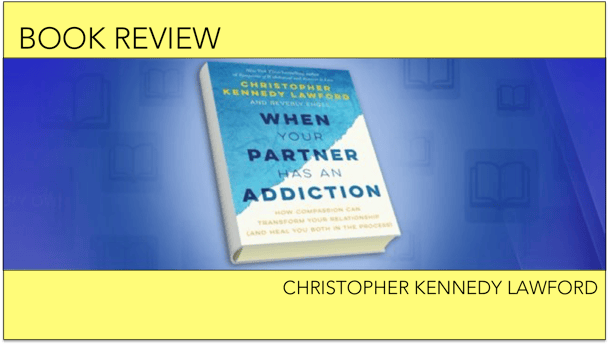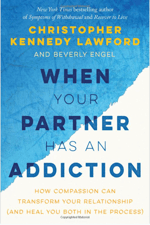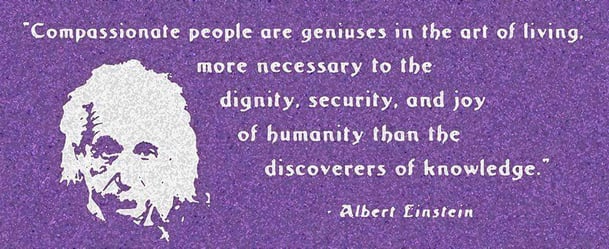
What do you do when your partner has an addiction? Stay or walk away?
Perhaps you’re wrestling with this question, having heard well-meaning advice from friends and family who tell you to just leave rather than run the risk of enabling.
That leaves you wondering, Does simply staying in a relationship with someone who abuses drugs or alcohol constitute enabling?
Living With An Alcoholic Spouse
 If you're dealing with an alcoholic or substance-abusing spouse, take heart, because you’re not alone.
If you're dealing with an alcoholic or substance-abusing spouse, take heart, because you’re not alone.
There are millions of people dealing with addiction issues in America, and millions of relationships are affected.
Loving and supporting someone with an addiction is a difficult road, but it is possible to walk it with love and integrity.
Christopher Kennedy Lawford tackles this tough topic in When Your Partner Has An Addiction: How Compassion Can Transform Your Relationship (And Heal You Both In The Process).
How to Help An Alcoholic Spouse
In When Your Partner Has An Addiction, co-authors Christopher Kennedy Lawford and Beverly Engel explore the question of why many smart, talented, sensitive, and caring people retreat into alcoholism or addiction.
Furthermore, the authors shed light on how spouses and partners can help these people to recover and contribute their gifts to the world. They cover important topics such as …
- What the latest research tells us about addiction and codependency, and how this might shape day-to-day choices
- The role of shame and addiction, and how to heal from shaming experiences
- How loved ones can create compassionate connections with their partners and within themselves
- The possible roles that partners and spouses can play in helping their loved ones to recover (and how to determine which role works best in a given relationship)
 Plus, Lawford shares stories from his own addiction recovery journey, detailing the underlying issues that fueled his drug use.
Plus, Lawford shares stories from his own addiction recovery journey, detailing the underlying issues that fueled his drug use.
From Post-Traumatic Stress Disorder (PTSD) to dysfunctional relational dynamics, Lawford writes from his own experience within the storied Kennedy family.
In turn, co-author Beverly Engel provides stories from her client base and portrays real-world interactions between partners.
A Sensitive Approach to Trauma and Addiction Treatment
One of our favorite things about this book is that it highlights the connection between trauma and addiction.
The authors advocate a trauma-sensitive approach to addiction recovery, explaining the strong link between abuse and neglect in childhood and addiction in adulthood.
Be nicer than necessary to everyone you meet. Everyone is fighting some kind of battle. — Socrates
They also include a helpful Appendix outlining the definitions of various types of trauma such as neglect, emotional abuse, and psychological maltreatment.
We’ve found that making the connection between trauma and addiction is key to recovery from substance abuse, and we appreciate Lawford and Engel’s emphasis on healing past hurts.
Myths and Truths About Addiction and Relationships from When Your Partner Has An Addiction:
Myth: If your loved one struggles with addiction, then you should blame yourself. If only you’d been different or better in some way, then the situation wouldn’t be so bad.
Truth: Your partner’s choice to use isn’t about you. Rather, it’s about his (or her) attempt to manage a deeply painful internal experience, likely the result of past trauma.
Myth: People who struggle with addiction are weak and lacking in willpower.
Truth: Most people with addictions are actually very strong, and that their addictive behaviors are adaptations that help them endure a lot of trauma.
Myth: People who struggle with addiction are insensitive and incapable of real love.
Truth: Many people who deal with addictions are very sensitive and loving, and they use substances to protect themselves from getting hurt and being shamed.
Myth: If you choose to stay with someone who has an addiction, then you’re crazy and/or lacking in healthy self-respect.
Truth: While many addicted spouses or partners struggle with codependency issues (defined as the need to create a false self in order to avoid shame and compensate for shame), they’re also strong, resilient people who can collaborate with their loved ones in recovery.
Myth: There’s absolutely nothing you can do to help an addicted spouse or loved one with an addiction.
Truth: On one hand, it’s true that another person’s choice to abuse substances doesn’t have anything to do with you. On the other hand, it’s also true that your behavior can potentially influence whether or not your partner stops using.
If you resist the temptation to shame him (or her), you may help your partner to stop blaming and start doing the work of healing.
Image credit: Leigh Blackall
Highlighted Quotes from When Your Partner Has An Addiction
“No one consciously chooses addiction to a substance or behavior over his partner. There are always reasons – powerful ones – why a person retreats into addiction.”
“Compassion is the most powerful tool you can have when it comes to healing addictions of any kind. Put simply, what your partner needs most from you is compassion.”
“Human beings have a deep need to bond and form connections. If we can’t connect with each other, we will connect with whatever we can find … It is disconnection that drives addiction.”
“We believe that codependency is even more than a tendency to put one’s own needs aside in order to focus on the needs and problems of others: Codependency is a need to create a false self.”
“It is not a coincidence that you and your partner are together. You each have something to learn from one another …. The most important thing you can do to support your partner in his [or her] recovery is to show that you are truly supportive and on his [or her] side.”
Verdict: This is a clear, concise, and compelling guide to supporting your loved one. We highly recommend it!
Want more? Check out our recent video interview with Christopher Kennedy Lawford, where we discuss the new book!
To learn more about supporting a loved one struggling with addiction, download our free eBook:
Support Loved Ones E-Book Download



